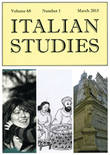
Italian Studies
Scope & Guideline
Unlocking the Rich Tapestry of Italian Language and Arts
Introduction
Aims and Scopes
- Literary Analysis and Criticism:
The journal publishes in-depth analyses of Italian literature from various periods, emphasizing critical perspectives on canonical and contemporary texts. - Cultural and Historical Contextualization:
Articles often contextualize literary works within broader cultural and historical frameworks, exploring how social, political, and economic factors influence the creation and interpretation of texts. - Gender and Identity Studies:
The journal frequently addresses themes of gender, sexuality, and identity, examining how these elements shape narratives and cultural representations in Italian literature. - Interdisciplinary Approaches:
Contributions often employ interdisciplinary methodologies, integrating insights from fields such as history, philosophy, cultural studies, and gender studies to enrich literary analysis. - Transnational Perspectives:
The journal includes discussions on the transnational dimensions of Italian literature and culture, particularly in relation to migration, diaspora, and cross-cultural influences. - Ecocriticism and Environmental Studies:
Recent publications have begun to explore ecocritical themes, addressing the representation of environmental issues in Italian literature and cinema.
Trending and Emerging
- Graphic Novels and Visual Culture:
There is a notable increase in articles addressing graphic novels as a legitimate form of literary expression, exploring their narrative techniques and cultural significance. - Biographical and Autobiographical Narratives:
Research focusing on biographical narratives, particularly those that intersect with issues of identity and representation, has gained momentum, highlighting the personal as political. - Queer Studies and LGBTQ+ Representation:
The journal is increasingly publishing works that explore queer themes and LGBTQ+ representation in literature, reflecting broader societal conversations about gender and sexuality. - Post-Colonial and Transnational Studies:
Emerging themes in post-colonial studies and transnational perspectives are prominent, particularly in relation to Italy's colonial past and its implications for contemporary literature. - Environmental Literature and Ecocriticism:
Recent articles have begun to engage with ecocritical perspectives, examining how literature reflects and responds to environmental crises and ecological concerns. - Intersectionality in Literary Studies:
There is a growing interest in intersectional approaches that consider how various social categories such as race, gender, and class intersect within literary texts.
Declining or Waning
- Historical Literary Movements:
There appears to be a decrease in articles focused on historical literary movements such as Neorealism, suggesting a shift towards contemporary literature and modern themes. - Traditional Canonical Texts:
The journal has seen fewer analyses of traditional canonical texts, indicating a movement towards more diverse and contemporary works, reflecting changing academic interests. - Regional Studies:
Research specifically centered on regional literature within Italy has become less frequent, possibly overshadowed by more global or transnational discussions. - Formalism and Structuralism:
Theoretical approaches rooted in formalism and structuralism seem to be declining, as newer methodologies that incorporate poststructuralist and feminist theories gain traction.
Similar Journals

Jordan Journal of Modern Languages & Literature
Advancing Scholarship in Modern Language StudiesJordan Journal of Modern Languages & Literature is a prestigious academic journal published by Yarmouk University, Deanship of Research & Graduate Studies. This journal serves as a vital platform for scholars and researchers in the fields of linguistics and literature, offering a well-rounded examination of modern languages and literary theory. With an impressive Q2 ranking in Linguistics and Language and a Q1 distinction in Literature and Literary Theory as of 2023, it consistently features high-quality research that contributes to the advancement of knowledge in these domains. The Scopus rankings further reflect its academic rigor, placing it in the 79th percentile for Literature and Literary Theory and maintaining significant influence in related fields, making it an essential resource for researchers, professionals, and students alike. Although it does not operate under an open-access model, the journal's commitment to publishing groundbreaking studies can significantly aid in the understanding and progression of modern linguistic and literary practices. The Jordan Journal of Modern Languages & Literature continues to be an influential voice in fostering scholarly dialogue and advancing research in the humanities.

Ermeneutica Letteraria-Rivista Internazionale
Cultivating Scholarly Conversations Across BordersErmeneutica Letteraria-Rivista Internazionale, published by FABRIZIO SERRA EDITORE, serves as a notable platform for the ongoing discourse in the fields of Arts and Humanities, Linguistics, Literature, and Literary Theory. Since its inception in 2019, this scholarly journal has become a significant reference point for innovative research while critically engaging with various literary paradigms and linguistic phenomena. Although currently classified in the Q4 quartile across its respective categories by Scopus, its commitment to open discourse invites submissions that challenge existing norms and broaden the horizons of contemporary literary critique. The journal's holistic approach not only supports the scholarly community in Italy but also aims to foster international dialogue among researchers, professionals, and students in the humanities. The journal is located in Pisa, Italy, and due to its open access policy, it seeks to ensure that knowledge is accessible to a wider audience while contributing to the collective understanding of literary interpretations and linguistic developments.
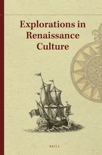
Explorations in Renaissance Culture
Unraveling the Tapestry of Renaissance ThoughtExplorations in Renaissance Culture, published by BRILL, is a pivotal academic journal that delves into the multifaceted aspects of Renaissance studies, encompassing Cultural Studies, History, Literature and Literary Theory, Music, Philosophy, and the Visual Arts. Established in 1976 and operating without an open access model, the journal has evolved as a critical platform for scholars and enthusiasts alike, providing rigorous analysis and innovative perspectives on the cultural currents of the Renaissance era. With an ISSN of 0098-2474 and an E-ISSN of 2352-6963, it has garnered a respectable standing among academic peers, evidenced by its quartile ranking in the Q4 category across multiple fields as of 2023 and its Scopus rankings, which acknowledge its role within the broader arts and humanities disciplines. Based in the Netherlands, the journal plays a vital role in fostering scholarly dialogue and advancing research, making it an essential resource for researchers, professionals, and students committed to expanding their understanding of this transformative period in history.

JOURNAL OF MODERN ITALIAN STUDIES
Illuminating Italy's Contemporary NarrativesThe Journal of Modern Italian Studies, published by Routledge Journals, Taylor & Francis Ltd, is a premier academic journal that has been at the forefront of exploring the rich and multifaceted dimensions of modern Italian culture since its inception in 1995. With an ISSN of 1354-571X and an E-ISSN of 1469-9583, this journal features a strong focus on Cultural Studies, History, Political Science and International Relations, as well as Sociology, achieving prestigious Q1 and Q2 quartile rankings as of 2023. It occupies an esteemed position in the academic landscape, holding notable Scopus ranks that highlight its significance within the fields of Arts and Humanities and Social Sciences. The journal aims to foster an understanding of Italy's contemporary issues, artistic endeavors, and political narratives, serving as an essential resource for researchers, students, and professionals interested in Italian studies and broader cultural discourses. Although it does not offer open access, its comprehensive and rigorously peer-reviewed articles make it a vital source of knowledge in the vibrant field of modern Italian scholarship.

Teksty Drugie
Exploring the Depths of Literary TheoryTeksty Drugie is a premier academic journal dedicated to the field of Literature and Literary Theory, published by the Polish Academy of Sciences, Institute of Literary Research. With its issuance beginning in 2008 and extending intermittently to 2020, this journal has been a significant contributor to literary scholarship in Poland and beyond. The journal holds a commendable Q2 ranking in its category for 2023, indicating its influential status amongst peers in the Arts and Humanities realm, and an impressive Scopus rank of #736 out of 934 in the Literature and Literary Theory domain, with a 21st percentile ranking. Researchers and students will find this journal invaluable for its rigorous academic standards and insightful contributions to contemporary literary discourse. While traditionally available through subscription, Teksty Drugie remains an essential resource for those engaged in the study of literature, offering critical theoretical perspectives and a forum for scholarly debate. The journal is located at ul. Nowy Świat 72, Pałac Staszica, Room 1, Warszawa 00-330, Poland.

CRITICA LETTERARIA
Fostering Innovative Perspectives in Literary StudiesCRITICA LETTERARIA is an esteemed literary journal published by Paolo Loffredo Iniziative Editoriali SRL that has been contributing to discussions in the field of literature and literary theory since its inception in 2009. With an ISSN of 0390-0142 and an E-ISSN of 2035-2638, this journal is indexed in Scopus, ranking in the category of Arts and Humanities under Literature and Literary Theory. It is classified in the Q4 quartile, indicating its dedication to serving a niche yet vital discourse within the broader literary community. Although currently not open access, the journal offers a platform for scholars, researchers, and students to engage with diverse literary analyses and theoretical advancements. Located in the vibrant city of Naples, Italy, CRITICA LETTERARIA aims to foster academic dialogue and promote innovative approaches in literary studies, making it an important resource for anyone passionate about navigating the complexities of literary narratives and theory.
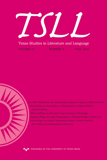
TEXAS STUDIES IN LITERATURE AND LANGUAGE
Navigating the Depths of Texas's Linguistic LandscapeTEXAS STUDIES IN LITERATURE AND LANGUAGE, published by University of Texas Press, is a distinguished scholarly journal dedicated to the exploration of the rich tapestry of literature and language from Texas and its encompassing regions. With its ISSN 0040-4691 and E-ISSN 1534-7303, this journal serves as a vital platform for researchers, educators, and students interested in the intersection of cultural studies, literary analysis, and linguistic inquiry. Despite the absence of Open Access, the journal remains an essential resource for those seeking rigorous academic discourse within the humanities. The journal, established in 1974, has published influential articles that contribute to a deeper understanding of Texas's unique literary heritage, making it a beacon of scholarship in American literature. The impact factor reflects its relevance and engagement in ongoing literary dialogues. We invite scholars and students alike to engage with the rich content provided, ensuring that Texas's literary legacy continues to be studied and celebrated.
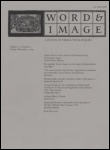
WORD & IMAGE
Advancing Scholarly Dialogue in Visual and Textual WorldsWORD & IMAGE is a distinguished journal published by Routledge Journals, Taylor & Francis Ltd, focusing on the dynamic interplay between visual and verbal communication. Established in 1985, this esteemed journal covers a wide array of topics within linguistics, literature, and visual arts, contributing significantly to these interdisciplinary fields. With a commitment to fostering scholarly dialogue and innovation, WORD & IMAGE presents qualitative research, critical analyses, and theoretical explorations that illuminate the complex relationships between text and image. The journal's current impact factor reflects its role in nurturing academic discourse, making it a vital resource for researchers, professionals, and students alike. Although currently not open access, the journal maintains a rigorous peer-review process to ensure the highest academic standards. As it continues to engage a global audience, WORD & IMAGE serves as a key platform for advancing knowledge at the intersection of language and visual culture.
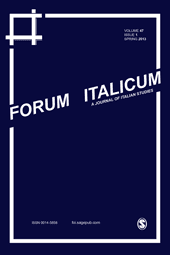
FORUM ITALICUM
Advancing Critical Inquiries in Cultural Studies and LinguisticsFORUM ITALICUM is a distinguished journal published by SAGE Publications Inc, focusing on the interdisciplinary fields of Cultural Studies, Linguistics, and Literary Theory. Established in 1967 and continuing its scholarly tradition into 2024, this journal aims to foster innovative dialogues and critical inquiries that intersect these dynamic disciplines. With an ISSN of 0014-5858 and an E-ISSN of 2168-989X, FORUM ITALICUM serves a global audience of researchers, professionals, and students. The journal holds a Q3 ranking in Cultural Studies and Literature and Literary Theory, illustrating its solid impact within these academic realms, while its presence in the Q4 tier within Linguistics and Language reflects its continued commitment to developing these areas of study. Despite its competitive rankings in Scopus, with percentages indicating varied fields in both the Arts and Humanities and Social Sciences, FORUM ITALICUM remains a vital platform for scholarly contributions that engage contemporary cultural phenomena and linguistic innovations. The journal advocates for Open Access publication to enhance the visibility and accessibility of its articles, making significant contributions readily available to the academic community. Located in Thousand Oaks, California, it continues to be an essential reference point for scholars seeking to explore the interplay between language, literature, and culture.
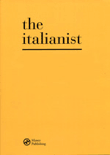
Italianist
Connecting Scholars Through the Lens of Italian StudiesItalianist is a distinguished peer-reviewed journal published by Routledge Journals, Taylor & Francis Ltd, focusing on the multifaceted aspects of Italian culture, history, and anthropology. With a proud history spanning from 1981 to 2001 and then again from 2003 to 2024, this journal caters to a global audience of scholars, professionals, and students seeking to deepen their understanding of Italian studies. Although it currently operates without an open access option, it provides invaluable insights that contribute to critical discourse in the field, evidenced by its rankings in Scopus: Q4 in Anthropology and Q3 in History, demonstrating its growing influence among academics. The journal is based in the United Kingdom and strives to promote high-quality research that explores historical narratives, cultural practices, and anthropological themes related to Italy, making it an essential resource for anyone interested in this rich and vibrant area of study.